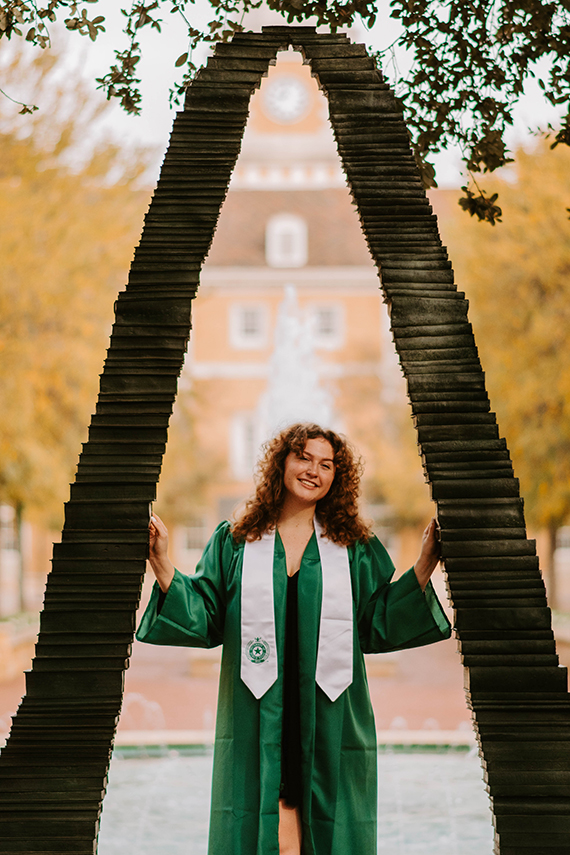 Coming from a family in the oil business, Audre never thought her college journey
at UNT would lead her to a career in environmental law, but that is exactly where
she is headed.
Coming from a family in the oil business, Audre never thought her college journey
at UNT would lead her to a career in environmental law, but that is exactly where
she is headed.
Audre chose UNT for its well-known forensic science program. She started her freshman year as a chemistry major with aspirations to become a forensic scientist. During her summer orientation, she realized a chemistry major wasn’t the right fit for her, so she switched to a bachelor’s in biology, but remained in the forensic science program.
It was not until the second semester of her freshman year that she started to question if forensic science was for her at all. Audre found herself really drawn to biological sciences, such as animal and plant science.
Another influence in Audre changing her major was growing up with her dad working on oil rigs. This gave her a unique perspective into the effects of the oil and gas industry.
“My pivot towards environmental science was not only influenced by the obvious effects of oil and gas giants on a warming climate, but also because of the impact it had on my family's life,” Audre says.
Audre’s dad would be gone for six or more weeks at a time working on oil rigs, and the work was not always consistent.
“Being left to the whims of the industry's own boom and bust cycle ultimately shaped how I viewed the oil and gas industry, as not only unsustainable in a long-term environmental perspective, but also unsustainable in family lives, too.”
With her new-found interest in life sciences, a family history in the oil industry, along with a lifelong passion for the environment, Audre felt inspired to change her major. Attending UNT campus, where being environmentally friendly is a staple of the university was also a major factor in her inspiration. Switching to Ecology for Environmental Science with a minor in Chemistry allowed Audre to explore more sustainable solutions for the future of energy and its impacts on the environment.
After switching her major, Audre dove headfirst into ecological work. She joined the Society for Ecological Restoration (SER), where she and the SER team have put in years of work to restore the UNT’s Discovery Park Pollinator Prairie back to its native habitat. Her team is proud to see the return of many birds and insects.
“It is super cool to see glimpses of what the prairie’s native habitat looked like 100 years ago,” Audre says.
Through the Society for Ecological Restoration, Audre also was able to secure an internship her sophomore year as a sustainability intern for Lake Lewisville Environmental Educational Learning Area (LLELA).
LLELA is a 2,600-acre park that was set aside for preservation and habitat restoration. Audre has done a lot of work in this area of Lake Lewisville, including invasive species removal of weeds and mesquite trees. Audre also worked with the LLELA team to install drainage piping through a creek in the park that was overflowing due to beaver activity.
Audre surprised herself and learned a lot about herself through this experience. As her team was racking their brains for a plan on how to install the drainage piping, Audre volunteered to get in the creek to install the pipes herself.
“It was in that moment that I realized I can do way more than I think I can,” says Audre.
Audre started to think about areas that are not as lucky as LLELA, areas of land that are not protected. Growing up in Katy, Audre has seen a lot of land that used to be prairies get turned into housing developments or shopping centers.
“I started to think about those kinds of areas and how those areas are becoming less and less because of development and insufficient policy. This is what got me turned towards law,” Audre says.
Pursuing environmental law will allow Audre to be more equipped with general knowledge of policy and the work that goes into determining what land is dedicated to development or preservation. One day, she hopes to be at the table when those discussions take place.
“A lot of times, there is a disconnect between the science and desired economic use of land in these conversations. I want to be a voice for the people I have worked with over the last several years,” Audre says. “I am excited to have my background in science so I can know how to apply that to policy in the future.”
The College of Science's commencement ceremony will be taking place in the UNT Coliseum at 8 a.m. on Friday, December 13, 2024.
For more information about UNT Commencement, please visit https://www.unt.edu/commencement/
Learn more about UNT's Great Grads